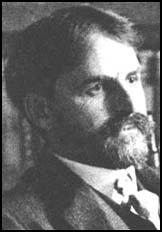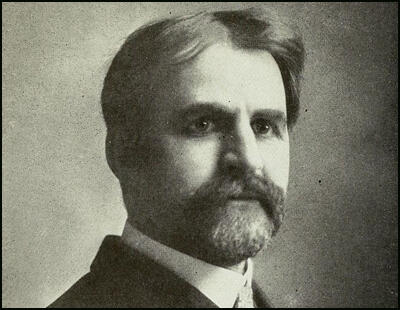Hamlin Garland

Hamlin Garland was born in West Salem, Wisconsin, on 14th September, 1860. His family were farmers struggling to make a living from the land. During his childhood his family moved from Wisconsin to Iowa and later to South Dakota.
Unable to afford a university education, Garland moved to Boston where he spent 14 hours a day reading in the public library. He eventually became a teacher at Moses True Brown's Boston School of Oratory. A brilliant teacher, Garland became a touring lecturer where he gave public talks on American, French and German authors.
Garland began contributing articles and stories to Harper's Weekly. A collection of his stories, Main Traveled Roads, appeared in 1891. Highly acclaimed, the book provided an unromantic view of farming. He dedicated the book to his parents: "whose half-century pilgrimage on the main roads of life has brought them only toil and deprivation."
Garland followed Main Traveled Roads with two other collections of short stories, Prairie Folks (1892) and Wayside Courtships (1897). In his book Crumbling Idols (1894), Garland put forward the theory of realistic fiction, which he called veritism. Stephen Crane, another supporter of veritism, explained that: "The realist or veritist is really an optimist, a dreamer. He sees life in terms of what it might be, as well as in terms of what it is; but he writes of what is, and, at his best, suggests what is to be."
Garland's novels were criticised as being overtly political propaganda. This included Jason Edwards (1892), A Member of the Third House (1892) and A Spoil of Office (1892). Other novels written by Garland included Rose of Dutcher's Coolly (1895) and The Captain of the Gray-Horse Troop (1902).

Garland returned to form with two outstanding volumes of autobiography, A Son of the Middle Border (1917) and A Daughter of the Middle Border (1921). In 1922 Garland inherited a considerable fortune. A socialist, Garland decided to set up an institution to dispense money to radical, liberal and trade union causes.
Over the next few years the American Fund for Public Service provided financial help to the National Association for the Advancement of Coloured People in its campaign against lynching, subsidized the radical magazine New Masses and aided the defence of Bartolomeo Vanzetti and Nicola Sacco.
Hamlin Garland, who was awarded the Pulitzer Prize in 1922, died on 4th March, 1940.
Primary Sources
(1) Benjamin Flower, Progressive Men, Women and Movements (1914)
Among the popular early novels dealing with tragic and evil existing conditions were Hamlin Garland's first four works. Main-Traveled Roads and Jason Edwards presented powerful and moving pictures of the grim and often tragic conditions of farm life in America in the nineties. A Member of the Third House was a virile and absorbingly interesting story dealing with the corruption of a State Legislature by a public-service corporation and was the pioneer of a host of similar novels that have played so great a part in arousing the people to a realization of one of the gravest evils that has threatened free institutions. A Spoil of Office was a sympathetic and inspiring study of the great agrarian uprising.
(2) Hamlin Garland, Trailing the Cowboy (1906)
The cowboy may respect churches but because of his mode of life, he seldom becomes "mashed" on them. He is just as apt to swear as any other man. He carries no gun, and never seeks a quarrel. He is a good rider, and long experience has made him acquainted with all the wonderful evolutions and ramifications of a bucking bronco. He can throw a lasso with unerring aim, is in the saddle twelve hours a day and as much of a gentleman as any other man, considering the lack of opportunity to acquire what the world calls "polish" - and no more so. He is neither saint nor sinner; a jovial, lighthearted, hardworking young fellow, who minds his own business, but who will not be imposed upon.
As you mingle with these cowboys, you find in them a strange mixture of good nature and recklessness. You are as safe with them on the plains as with any class of men, so long as you do not impose upon them. They will even deny themselves for your comfort, and imperil their lives for your safety. But impose upon them, or arouse their ire, and your life is of no more value in their esteem than that of a coyote.
Morally, as a class, they are toulmouthed, blasphemous, drunken, lecherous, utterly corrupt. Usually harmless on the plains when sober, they are dreaded in towns, for then liquor has the ascendency over them. They are also as improvident as the veriest "Jack" of the sea...
They never own any interest in the stock they tend. This dark picture of the cowboys ought to be lightened by the statement that there is occasionally a white sheep among the black. True and devoted Christians are found in such company - men who will kneel down regularly and offer their prayers in the midst of their bawdy and cursing associates. They are like Lot in Sodom.

